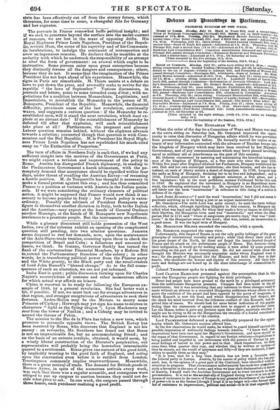While a gloomy discontent still holds possession of the West
Indies, two of the colonies exhibit an opening of the complicated question still pending, into two ulterior questions. Jamaica seems disposed to rest her demands, now, upon the maintenance of the Anti-Slave-trade treaties, counting upon them to check the competition of Brazil and Cuba: a fallacious and unsound re- liance, we think. In Guiana, Governor Barkly has turned the Lank of the contumacious Financial Members, by a Reform Bill to,extend the Parliamentary franchise of the colony ; in other words, he is transferring political power from the Planter party and the White gentry, to the Black party and the retail-traders of Lord John Russell "blessed change.' As to the full conse- quences of such an alteration, we are not yet informed. India East is quiet ; public discussion turning upon Sir Charles Napier's eccentricities of costume and other momentous affairs for which actual war affords no leisure.
China is reported to be ready for following the European ex- ample of 1848, by a general revolution. She had better wait a bit, if possible. If not, we must look out for strange adventures in that region, and stranger emigrations of adventurers to seek their fortunes. Ledru-Rollin may be the Medoro to marry some Princess of Cathay ; Herwegh may yet sign his name to decrees in characters "light as the flying dragon ' ; Lyon Mackenzie may roar from the tower of Nankin ; and a Coburg may be invited to ascend the throne of Pekin.
The mission to the Rio de la Plata has taken a new turn, which promises to reconcile opposite views. The British Envoy has been received by Roses, who discovers that England is not his enemy : en revanche, 5/1r. Southern has found out that Roma is not an impracticable foe, but an accommodating friend ; and on the basis of an entente cordiale, obtained, it would seem, by a wisely liberal construction of the Dictator's perplexities, our representative will probably bring the heretofore interminable quarrel to a settlement. Roses gives one earnest of his good faith, by implicitly trusting to the good faith of England, and acting upon the convention even before it is ratified from London. Trustingness commonly implies trustworthiness. Meanwhile, there is a great revival of trade. The demand for British goods in Buenos Ayres, in spite of the numerous arrivals every week, was such that there was a regular scramble, and consignees were obliged to put up cargoes to auction because they could not de- cide what price to ask. In one week, the cargoes passed through three hands, each purchaser realizing a good profit.


























 Previous page
Previous page